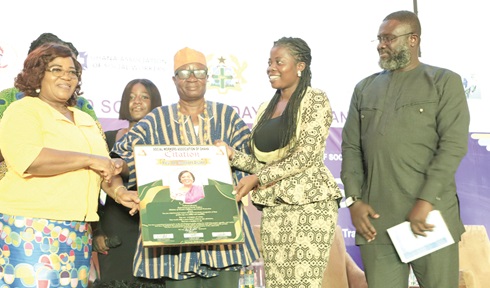
Recognise, support social workers — Stakeholders
Speakers at a national symposium to commemorate World Social Work Day in Ghana have called for greater acknowledgement and support for social work practice in the country to enhance professional service delivery.
They also underscored the speedy passage of the Social Work Profession Bill into law to regulate social work practice and align it with international standards.
The bill, which was developed with support from UNICEF and USAID, is currently with the Office of the Attorney-General and Ministry of Justice.
The symposium was on the theme: “Professionalisation of social work practice, a shared future for Ghana’s transformative change.”
Professionalism
The Head of Local Government Services, Nana Ato Arthur, acknowledged the demanding and emotionally tasking nature of social work, highlighting the sacrifices made by social workers to rescue abandoned children and address various societal challenges.
He said working in silos was no longer viable and reaffirmed his office's commitment to collaborating with stakeholders to support the training and equipping of social workers for the development of the country.
The Director of the Social Welfare Department, Rev. Dr Comfort Asare, advocated the transformation of the social work profession and stressed the importance of recruiting trained social workers rather than individuals without formal training to handle sensitive matters.
Tracing the history of social work, Dr Asare noted that it was formally recognised in the country on April 1, 1943, and highlighted the challenges over the years, including the placement of the department under various ministries.
In spite of efforts to institutionalise social work, Dr Asare acknowledged that the profession still faced challenges such as lack of focus, direction and lack of a unified front of practitioners.
Dr Asare called for renewed commitment and collaboration among stakeholders to advance the social work profession in Ghana and ensure that social workers were equipped to effectively address the diverse social challenges facing the nation.
Deliberate actions
The Head of Civil Service, Evans Aggrey-Darkoh, called for deliberate action in effecting positive change in social practice in Ghana, stating, "we can't wish for it; we need to be deliberate about the things we do."
He commended their dedication to standing up for human rights, social justice, and tirelessly working to make the world a better place.
He highlighted the essential qualities that defined social workers, emphasising that their role extended beyond a job—it is a calling but despite their crucial role, social workers have often been disregarded and not adequately acknowledged for their efforts.
The Head of the Department of Social Work at the University of Ghana, Dr Augustina Naami, pledged the commitment of the university to continue to train competent social workers and also support all efforts to professionalise the practice in the country.
Training
Dr Naami emphasised the significance of professionalisation in social work practice, including education, training, ethical guidelines and continuous professional development.
The President of the Ghana Association of Social Workers (GASOW), Prof. Kwadwo Ofori Dua, and the President of the Social Workers Association of Ghana (SWAG), Devine Exorgbe, in separate speeches lauded the efforts of social workers across Ghana, Africa, and conflict-ridden regions worldwide.
They emphasised the importance of professionalisation in enhancing the credibility, trust and quality of social services provided to clients.
They urged all citizens to support the campaign for professionalisation, emphasising that it required collective efforts to spread awareness and achieve the desired outcome.
The Chief of Child Protection at United Nations Childrens Fund (UNICEF), Lucia Soleti, described social workers as heroes and highlighted the need for legal recognition and support for social workers, who are often in the front line of protecting vulnerable members of society.
Ms Soleti noted that UNICEF had supported Ghana to address the issue of a lack of formal legislation framework that would lead to the establishment of a Social Work Council to regulate the practice and license practitioners.
Through an initiative supported by UNICEF and USAID, the government had developed an in-service training package tailored to equip social welfare district offices and development officers and safeguard vulnerable populations.
